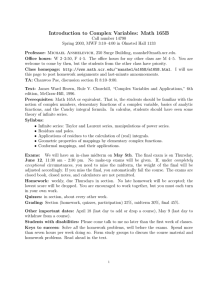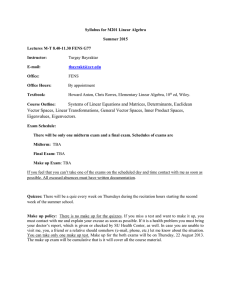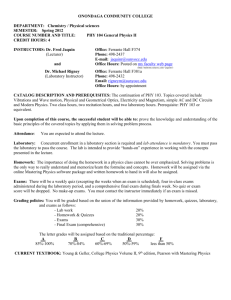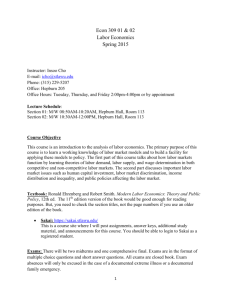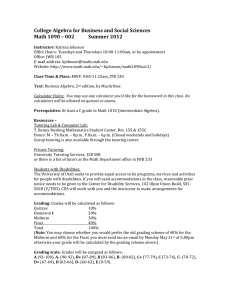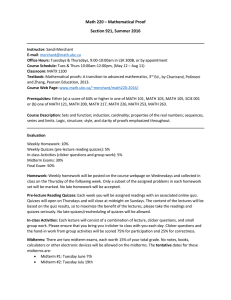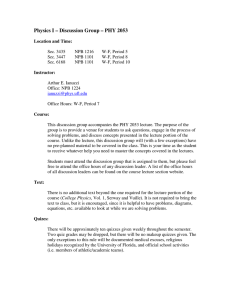PHY 3221: Mechanics I Fall Term 2010 Syllabus
advertisement
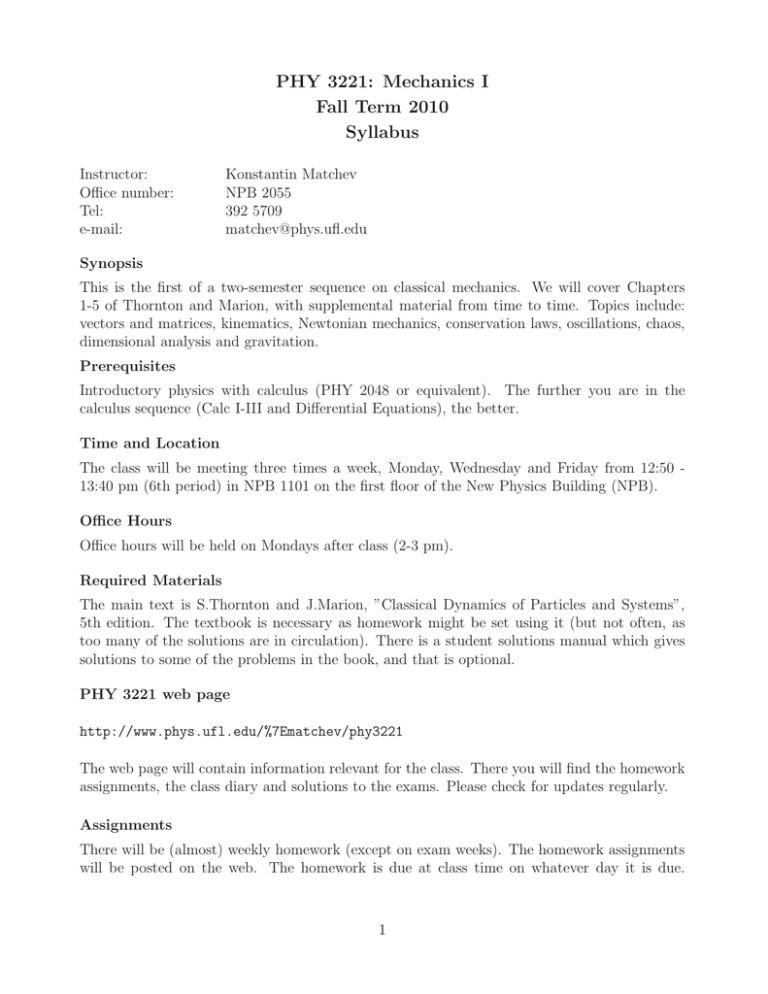
PHY 3221: Mechanics I Fall Term 2010 Syllabus Instructor: Office number: Tel: e-mail: Konstantin Matchev NPB 2055 392 5709 matchev@phys.ufl.edu Synopsis This is the first of a two-semester sequence on classical mechanics. We will cover Chapters 1-5 of Thornton and Marion, with supplemental material from time to time. Topics include: vectors and matrices, kinematics, Newtonian mechanics, conservation laws, oscillations, chaos, dimensional analysis and gravitation. Prerequisites Introductory physics with calculus (PHY 2048 or equivalent). The further you are in the calculus sequence (Calc I-III and Differential Equations), the better. Time and Location The class will be meeting three times a week, Monday, Wednesday and Friday from 12:50 13:40 pm (6th period) in NPB 1101 on the first floor of the New Physics Building (NPB). Office Hours Office hours will be held on Mondays after class (2-3 pm). Required Materials The main text is S.Thornton and J.Marion, ”Classical Dynamics of Particles and Systems”, 5th edition. The textbook is necessary as homework might be set using it (but not often, as too many of the solutions are in circulation). There is a student solutions manual which gives solutions to some of the problems in the book, and that is optional. PHY 3221 web page http://www.phys.ufl.edu/%7Ematchev/phy3221 The web page will contain information relevant for the class. There you will find the homework assignments, the class diary and solutions to the exams. Please check for updates regularly. Assignments There will be (almost) weekly homework (except on exam weeks). The homework assignments will be posted on the web. The homework is due at class time on whatever day it is due. 1 Solutions should be complete and legible. Late homework will be accepted but will have points deducted: 50% for one day late, 100% for 2 or more days late. Homework constitutes no more than 10% of the grade (see grading policy below). Exams There will be three in-class midterm exams and one final exam. The dates of the exams have already been announced. The midterms will always take place on a Wednesday during class (12:50 - 13:40 pm), and will be on September 29, October 27 and December 1. The final exam will be on Tuesday December 14 at 12:30 pm. In addition, there will be a certain number NQ of surprise Wednesday quizzes throughout the semester. The quizzes will be unannounced, but it is known that they will always take place on a Wednesday. No quiz shall be given on the day before Thanksgiving (November 24) or the last day of classes (December 8). Each quiz will last roughly 15 min and will be administered at the beginning of the lecture. The total number NQ is also a surprise: it ranges from 0 to 10 (obviously), with an expectation value of hNQ i = 3 ± 2. All tests will be ”closed book”, but a formula sheet will be provided. Calculators, cell-phones and other hi-tech gadgets are not allowed. Grading policy The lowest score among the surprise quizzes will be dropped (this is why no makeup quizzes 100% to the total will be given). Each quiz will then contribute a weight of WQ = 16+max(N Q −1,0) grade. The homework will then have weight 2WQ , each midterm will weigh 3WQ and the final will weigh 5WQ . The grades will not be curved. Anyone who scores 85% or higher on each of the three midterm exams will be given an A and will not be required to take the final exam. A student whose average grade on the three midterms is 85 points or above, but who has at least one midterm score below 85 points, will be required to take the final. A guaranteed grading scale has been announced: A: 85% A− : 80% B+ : 75% B: 70% B− : 65% C+ : 60% C: 55% C− : 50% D+ : 45% D: 40% D− : 35% 2 Final word of advice 1. Work hard. This is not an easy course, to a large extent your success will be correlated with the total number of problems you solve independently throughout the semester. 2. Attend Class. Remember, the syllabus is defined by what is covered in lectures. You will not be tested on material not covered in class. If you miss class, my advice is to ask a class-mate (or me) for notes. In office hours, I am happy to explain things which you did not understand in class. I am not so happy to explain things that you have not seen because you were not in class and did not get anybody’s notes. Also, if you get sick, please stay at home and ask a class-mate (or me) for a copy of the notes later (after you have recovered). 3. Be on time for class. Announcements are generally made at the beginning of each lecture, and you are responsible for learning of these whether you attend class or not. 4. If you are struggling, ask for help. The best way to get hold of me is after class, in our assigned office hours, or by e-mail. It is tough to discuss physics by e-mail, so it is better to make questions specific. If you want to discuss physics and cannot make time during my office hours, I can be flexible, but check with me first. 5. Take notes. Something that is obvious at the time is quickly forgotten. When it comes to the night before a test, you will appreciate a good set of lecture notes. If it is not in your notes, you’ll regret it! 6. Do your own homework. I cannot police copying, but you will look foolish if you can do a homework question and then, when the same question comes up on the final, you have no idea how to approach it. 3

